Louis van Gaal: Champions League failure raises questions
- Published
- comments
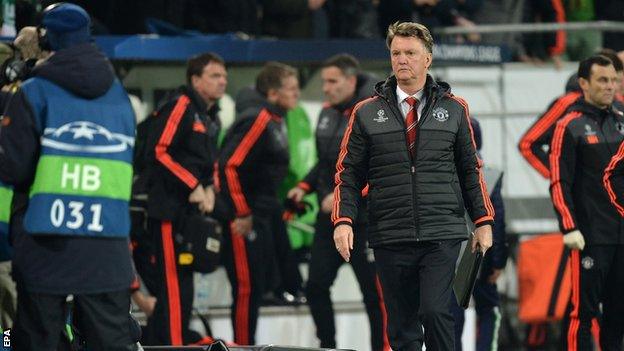
United took the lead through an Anthony Martial goal, but Wolfsburg came back to win 3-2
Manchester United's return to the Champions League was regarded as the crowning glory of manager Louis van Gaal's first season at Old Trafford.
After the ill-fated decision to appoint David Moyes as successor to Sir Alex Ferguson, the former Netherlands coach brought a measure of stability, albeit without silverware, and a place in the Premier League's top four.
It has proved an inglorious, embarrassing comeback to Europe's elite tournament; United not even scrambling out of the group stage after defeat by Wolfsburg in Germany on Tuesday.
What now for Louis van Gaal?
It will come as a huge shock to United's hierarchy, as well as Van Gaal, that they will have their noses pressed up against the Champions League window when it resumes in 2016.
The feeling inside Old Trafford was qualification would have been assured before they even reached the industrial heartland of Wolfsburg for the finale. This was a vain hope.
Man Utd are better than last year - Van Gaal
United's elimination came after a valiant showing against Wolfsburg but a colourless performance in the home game against PSV Eindhoven left them with a hurdle that was too high to negotiate.
That poor show was more representative of United than any of the small positives that can be taken away from their final, decisive game.
This was not a testing group for a team of United's financial and footballing stature - and Van Gaal cannot realistically be taken seriously if he tells any hard luck stories.
More on Manchester United's exit: |
|---|
United were as good in attack as they have been throughout the group stages in Germany but they defended abysmally and ultimately did not deserve to reach the knockout phase.
And, with growing discontent among United's support about Van Gaal's pragmatic style, the prospect of preparing for Europa League action on Thursday nights will not improve his standing.
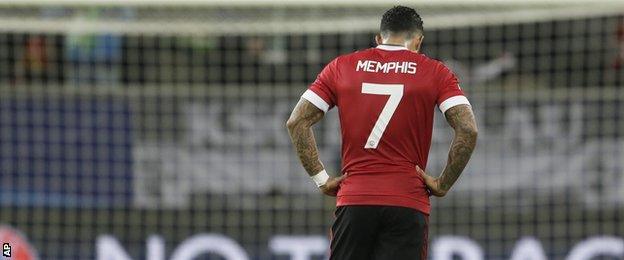
Memphis Depay joined United from PSV in May but it was his former club who went through to the knockout stages
There is no suggestion that even a failure of this significance will put Van Gaal's position in jeopardy, but to have spent in excess of £250m and slipped out so tamely is bound to raise questions about how comfortable a fit he is for the demands of Old Trafford.
It is fully expected Van Gaal will see out the final 18 months of his contract but football is a fluid game and he will need big results between now and the end of the season to stem rising unhappiness about United's style of play.
In Van Gaal's defence, it should be pointed out that United have suffered a dreadful run of injuries, from the moment in-form Luke Shaw broke his leg in the opening group defeat against PSV. Wayne Rooney was also missing in Germany, along with defenders Phil Jones and Marcos Rojo as well as midfield man Ander Herrera.
It was still startling, however, to see Michael Carrick's experience ignored until he came on for the labouring Bastian Schweinsteiger and the almost missing-in-action and forgotten Nick Powell replacing Juan Mata when goals were needed.
Van Gaal has perhaps not been given the credit he deserves for stabilising United and restoring them to the top four last season but, given the continued outlay, the veteran coach needs to improve on that and give the club a return on their vast investment.
The Dutchman, unlike Moyes before him, sounds full of conviction with every statement he makes. The big problem he has is his team are utterly unconvincing.
Does this speed up United's succession planning?
Barring the steepest of declines, the full intention of Old Trafford's power brokers is to keep Van Gaal until the end of his contract in 2017. Results like Tuesday's, however, may well mean they will train their eyes even more keenly on who will succeed him.
It would stretch credibility to breaking point to believe United's top brass have not given some thought to who will be the next man in the manager's office at Carrington.
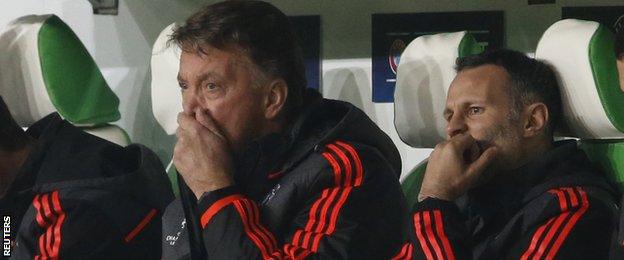
Speaking after the game, Van Gaal said United are improving
Former AC Milan, Paris St-Germain, Chelsea and Real Madrid manager Carlo Ancelotti is out of work and has admitted he would like to work in the Premier League again. The name of Pep Guardiola will entice any Premier League club as he considers his future at Bayern Munich.
The solutions may yet be found closer to home and those graduates from Ferguson and youth coach Eric Harrison's famous 'Class of 92'.
Ryan Giggs is the quietest second fiddle around - a seemingly silent partner to the single-minded, almost dictatorial Van Gaal, but events elsewhere in the past few days have perhaps shifted emphasis significantly.
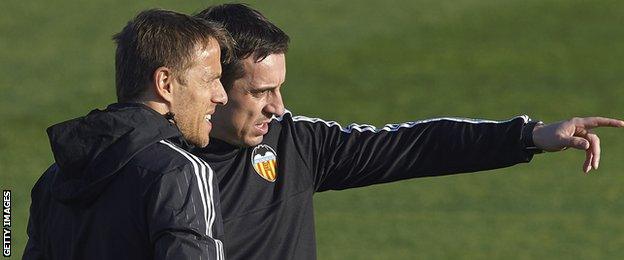
Gary Neville (right) has taken charge of Spanish club Valencia - his first managerial role - until the end of the season
While Giggs is regarded as having made progress by some within the club in his assistant's role - although it is hard to see how he can endorse the current playing style given his Old Trafford upbringing - there is no doubt those inside the club will be keeping a close eye on how Gary Neville develops having taken over at Valencia, with his brother Phil on his backroom staff.
Another member of that famous group, Paul Scholes, has emerged as one of the fiercest critics of the Van Gaal regime - so it is perhaps Neville's ascent that has given this narrative its most interesting twist.
As with Giggs, Neville knows United, knows the Premier League and the club would still be an attraction for any manager of ambition and quality.
So while there is no heat on Van Gaal, that is unlikely to stop those in control at United thinking of the framework for the future.
What is Van Gaal's next step?
The first priority is to get back to winning ways at Bournemouth this weekend in the Premier League - then devise his strategy for the rest of the season.
While the immediate prospect of the Europa League is not appetising, with former United defender Rio Ferdinand describing the notion of those Thursday night games as "embarrassing", it may yet form a crucial part of United's season.
Van Gaal must weigh up the possibility of not taking it seriously, knowing Premier League rivals such as Liverpool and Tottenham have already proved they will, against its possible impact on league form.
Will involvement help or hinder United's Premier League campaign? It is currently an imponderable and a trophy in the cabinet is still enough to warm the hearts of most disgruntled fans.

United play Sheffield United in the FA Cup third round - and are fourth in the Premier League
It is a tough balancing act, particularly as Van Gaal is wrestling with that injury list - Chris Smalling the latest casualty as he limped through those closing minutes in Wolfsburg.
United are only three points off the Premier League summit, so have the chance of being genuine challengers in an unpredictable season, but Van Gaal must find the way to balance his team between attack and defence.
They have the best defensive record in the league, conceding only 10, but have scored only 20 - 12 fewer than leaders Leicester City.
In 53 league games Van Gaal has overseen seven 0-0 draws - at a percentage of 13.21% that is over twice that of Ferguson (5.56%) and Moyes (5.88%).
This was one of many puzzles Van Gaal had to solve as the devastated and dispirited United party flew out of Germany and into the perceived oblivion of the Europa League.
Are Man Utd now simply European second-raters?
United supporters like to sing about their standing as "The pride of all Europe" - the truth of the matter is they were not even that in the latter days of Ferguson's regime and this exit simply underlines their reduced status.
United last won the Champions League against Chelsea in 2008, but further final appearances against Barcelona in 2009 and 2011 ended with Ferguson's side utterly outclassed on both occasions. They did not even made it out of the group stage in 2011-2012.
Since those days, Europe's elite such as Barcelona, Real Madrid, Bayern Munich and now even Paris St-Germain have got away from United.
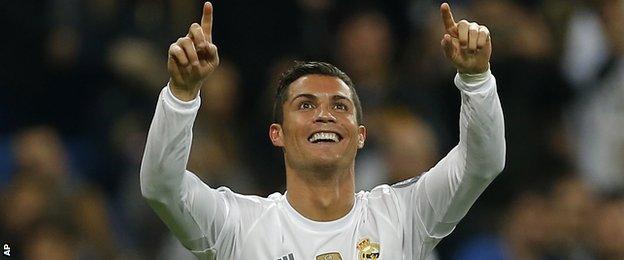
Ex-United forward Cristiano Ronaldo scored his 88th Champions League goal as Real beat Malmo 8-0 on Tuesday
The European decline has been setting in for years, so perhaps this campaign was simply another reality check.
United's name does not strike fear into Europe's top teams these days and, on the evidence of this doomed group stage, will not daunt the bigger names in the Europa League either.
The feeling inside Old Trafford is that, in terms of priority, the Premier League makes up 80% of their season and Europe the remaining 20%. Everyone at Manchester United must hope, for their sakes, that Van Gaal can make the sums add up.
- Published9 December 2015
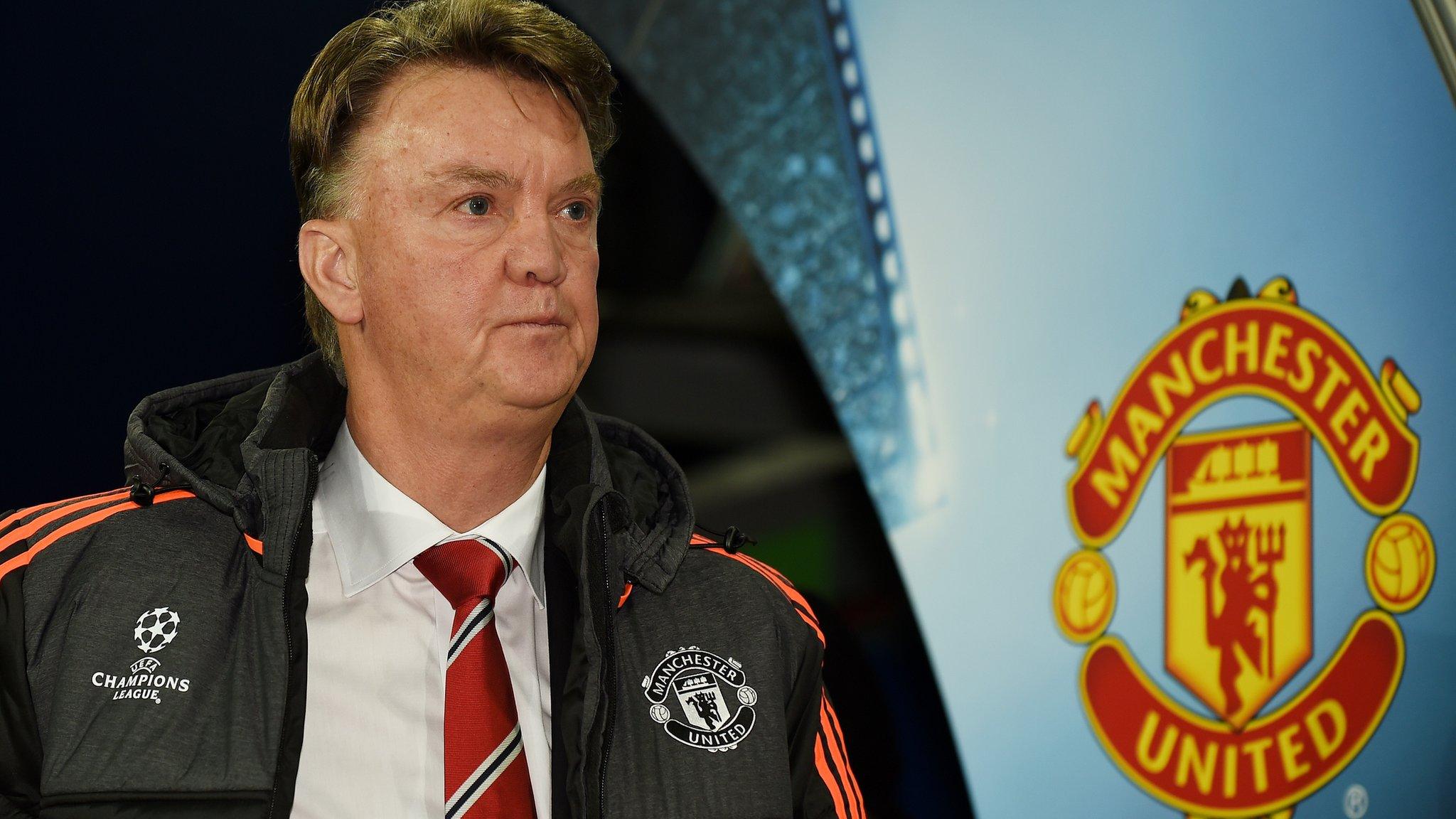
- Published8 December 2015
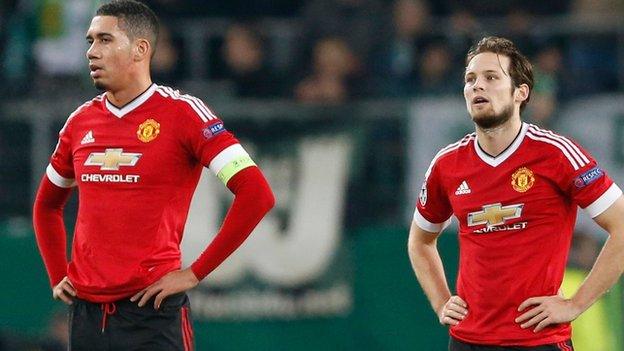
- Published9 December 2015
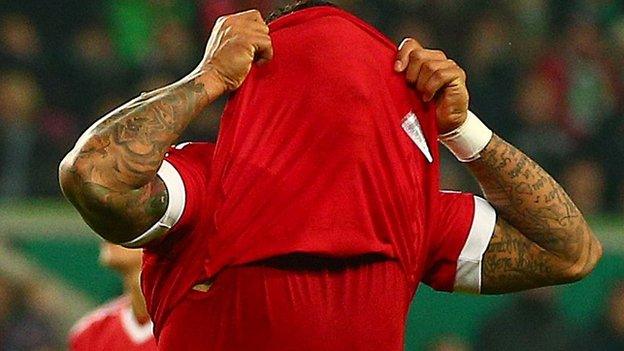
- Published8 December 2015
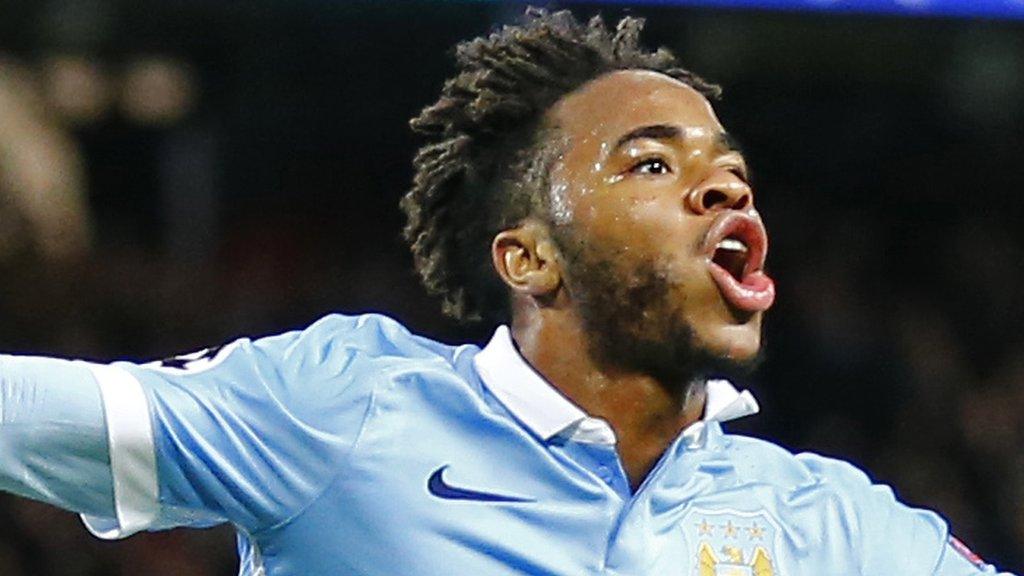
- Published20 June 2016

- Published7 June 2019
